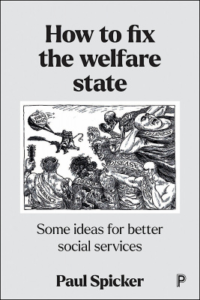 Two years ago, How to fix the welfare state was published. We have an election coming up, and many of the issues that I discuss in the book will come up during political debates. I’d like to think that the book could offer some foundation for those arguments, but bitter experience says it probably won’t.
Two years ago, How to fix the welfare state was published. We have an election coming up, and many of the issues that I discuss in the book will come up during political debates. I’d like to think that the book could offer some foundation for those arguments, but bitter experience says it probably won’t.
I was looking at other material online, via the University Press system, when I came across a description of my book, and discovered that it wasn’t the material I had sent to the publisher. Someone had obviously decided not to use the abstracts I sent in, and replaced them with gobbledegook. For example, the abstract of the last chapter now reads: “This chapter focuses on the condition of the welfare state. It notes the claims of welfare wasting money and of being undermined by fraudulent claims. The arguments for personalisation are well-meaning as the option of choice becomes available in public policy. … ” This has no direct relation to anything I’ve written, and that third sentence there makes no sense to me at all. I’ve raised this with the publisher, but in the meantime I’m going to post the abstracts I submitted here, in the hope that anyone who’s looking for the material would prefer to judge it by something that’s minimally coherent. If you’d like to know what basis there is for the arguments that follow – they’re all in the book.
How to fix the welfare state: abstract
The book discusses a range of issues in the British ‘welfare state’. Chapters outline the structure of services, the impact of some false and misleading narratives, and the problems that need to be addressed. Many aspects of the dominant policy narratives, such as personalisation, marketisation, when to opt for private provision or the influence of individualism, have created further problems, and diverted attention from the main issues. The book points to a range of different issues, including questions of size, centralisation, co-ordination and complexity. It points to the ways that the services have gone wrong, and makes suggestions about what they need to do to get things right.
Chapter 1: Introduction
This introductory chapter covers:
* Arguments for welfare
* The criticisms made of the welfare state from the right wing
* A brief history of social services, considering the Poor Law and after, and
* The plan of the book.
Chapter 2: Social security
Key points
Social security provides money, to be spent in a commercial market.
Money can be brought together from different sources. It doesn’t have to be done by one benefit.
Social security is provided for many reasons, but its main purpose is to provide some secure income.
Positive developments
Most of the cost of social security currently consists of benefits offering a secure but only partial contribution towards income. Earnings-related pensions, Child Benefit and benefits for disability were all developed after the welfare state’s foundation.
Where policy has gone wrong
Some degree of selectivity is necessary, but the process is liable to fail in some cases and to leave gaps in others.
Lumping benefits together doesn’t make them simpler.
Benefits don’t have much to do with work. Tying social security to employment services has been to the detriment of both.
What to do instead
A secure income can have many components. The benefits package can be made of smaller, more specific benefits.
Benefits need to be less conditional, and more predictable. More could be universal.
Chapter 3: The NHS
Key points
The NHS offers a form of insurance, providing medical care to anyone.
Despite the dominance of hospitals, general practice is at the heart of what the NHS does.
The need for public health has been highlighted by recent experience.
Positive developments
The NHS has moved away from long-stay institutions and focused on medical care.
General practice has been greatly improved.
Where policy has gone wrong
Private markets cannot fill the gaps. They depend on producers having choices, and that leads to exclusion.
Health is public as well as individual. Reducing everything to the personal level compromises the aims of health services.
What to do instead
The health service has to provide different levels of service: decentralised general services, more specialised work for larger areas, and highly specialised centralised provision.
Chapter 4: Social care
Key points
The shift from health care has left services that are fragmentary, insecure and often expensive.
Residential care has grown because it is an effective way of providing intensive services, but not all residents need that.
Domiciliary care has been based in a flawed model of ‘personalisation’ – and a catastrophic assumption that it won’t be sustainable.
Care in any setting depends on continuing personal relationships.
Positive developments
This service did not exist when the welfare state was founded.
It was created as part of the movement away from long-stay institutions. It has its failings, but at least it has made it possible for some people to continue to live in their own homes.
Where policy has gone wrong
Personalisation has never lived up to its promise; it only works for some.
Creating something like a market in social care is no guarantee of choice.
Markets offer commodities; people who need care need something different.
What to do instead
The clients of social care need people with time and skills, not a shopping list of the tasks that workers will fulfil. Both residential and domiciliary care will need teams of carers who can offer a personal service to clients.
Chapter 5: Education
Key points
Education depends on a process of development, not on any set quantity of knowledge.
Disadvantages can be cumulative.
Positive developments
The welfare state secured free secondary education. Later developments made this comprehensive, and greatly expanded higher education.
Where policy has gone wrong
Equal opportunity is not enough; in an unequal society, it becomes the opportunity to be unequal.
Students don’t necessarily ‘catch up’ by being taught faster.
The problem of low attainment is not about how schools are managed.
What to do instead
We need a stronger focus on human development. This would include a major emphasis on primary and elementary education, a review of the secondary curriculum, and reconsideration of the structure of assessment to allow for appropriate final stage qualifications.
Chapter 6: Child protection
Key points
Most families raise children well enough. Some don’t.
Child protection is a residual service, for children where family fails.
Some things can still be done for every child. The residue of children requiring protection can be reduced but not eliminated.
Positive developments
Preventative work scarcely existed when the welfare state was founded; services could only react after the event.
Where policy has gone wrong
Some families are poor, but that is not the same as saying they are not good families.
It is not true that dependency is passed on from generation to generation.
What to do instead
Children need protection. Part can be done universally, but unavoidably part must be done individually and personally.
Chapter 7: Housing
Key points
People have to live where they can. If there are not enough houses, some people will live in unfit housing, some will have no home of their own; and some will be physically homeless.
Positive developments
The legacy of post-war policies has been a greatly improved and expanded housing stock.
Social housing continues to provide essential, good quality housing to those who cannot afford adequate housing within a market-oriented system.
Where policy has gone wrong
The housing market does not work in the way that free-marketeers imagine.
The issues of tenure and affordability disguise the real issues: access and deprivation.
The problems of the housing system are structural, not the result of individual failings.
What to do instead
We need a substantial, continuing increase in the stock of housing, in order to ensure access and adequate standards.
A programme of regeneration is needed to save towns and regions that have been marginalised.
Chapter 8: Employment services
Key points
The level of employment is mainly dependent on the economy, not on individual effort.
At their best, employment services offer support and training to help people engage with the labour market; but they cannot create jobs or guarantee decent employment.
Positive developments
Where macroeconomic policies have been applied, they have greatly diminished the level of unemployment.
Where policy has gone wrong
‘Active’ labour market policy shifts the burden of unemployment to the people who experience it.
Incentives are not a simple matter of comparing benefit levels with wages.
The standard microeconomic analysis, presenting unemployment as a matter of personal choice, is an ideological prejudice, not social science.
Employment services have suffered by being muddled with benefits.
What to do instead
Unemployment is a waste of human resources. We need large numbers of people in a range of professions. Government can, and should, create jobs. It can do this through expanding public employment.
Chapter 9: Equalities and human rights
Key points
‘Equality’ is about the removal of disadvantage. ‘Equalities’ refer to specific disadvantages.
The disadvantages can be cumulative.
Positive developments
The services described here, and the principles on which they are founded, were hardly thought of at the time of the foundation of the welfare state.
Where policy has gone wrong
Human rights outline the bare minimum; citizens need more than that.
What to do instead
Legal redress is fundamental to justice, but it only goes so far. The law has to be clearly stated, and legal protection has to be accessible and affordable.
Chapter 10: Public services
Key points
Public services are guided by public policy. They work to different criteria from private services.
Universal services can be available to anyone; some are available to everyone.
Positive developments
At a time when public services have been eroded or privatised, some have gone against the trend: charges for prescriptions and eye tests have been removed in Scotland, charges for museums were introduced but then abolished, several areas have introduced bus passes for older people and those with disabilities, there are planned extensions of free school meals and transport for children.
Some private firms have recognised the case for free public access.
Where policy has gone wrong
Markets sometimes fail, and market provision is always incomplete. That is tolerable in some fields and not in others.
What to do instead
Some services are better taken out of the private market. The more this can be done, the greater the security the welfare state will offer.
Chapter 11: Towards a stronger welfare state
The concluding chapter considers issues more generally, reviewing
* Misleading trends – choice and personalization, privatisation and marketisation, individualisation
* General problems: problems of size, centralization, coordination, practical capacity, and cost
* Approaches to reform.

